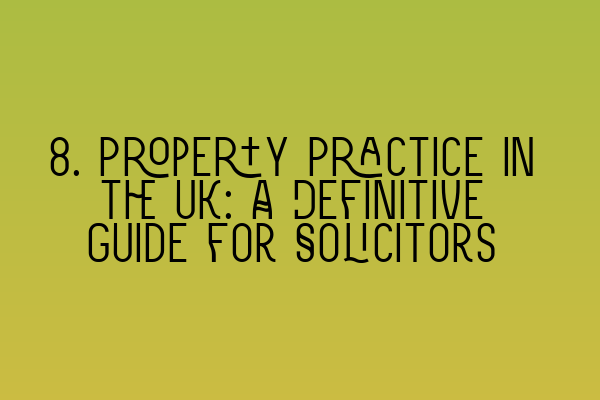Property Practice in the UK: A Definitive Guide for Solicitors
Welcome to SQE Property Law & Land Law, where our team of expert solicitors provide comprehensive guidance in property law matters. In this in-depth guide, we will cover the essential aspects of property practice in the UK, aimed specifically at solicitors. Whether you are a newly qualified solicitor or looking to refresh your knowledge, this guide will equip you with the necessary expertise to navigate the complexities of property law with confidence.
1. Introduction to Property Practice
Property practice involves the legal transactions, disputes, and regulations related to real estate. It is crucial for solicitors to have a comprehensive understanding of property law as they often represent clients in various property matters, such as conveyancing, leases, mortgages, and property disputes.
SQE 1 Practice Exam Questions are an excellent resource to test your knowledge and prepare for the Solicitors Qualifying Examination (SQE). It’s crucial to have a solid foundation in property law to excel in this exam.
2. Conveyancing
One of the core areas of property practice is conveyancing, which pertains to the legal transfer of property ownership from one party to another. Solicitors play a crucial role in ensuring a smooth conveyancing process, which involves drafting, reviewing, and exchanging contracts, conducting property searches, and facilitating the transfer of funds.
To enhance your conveyancing skills, consider taking SQE 2 Preparation Courses. These courses provide practical insights and knowledge necessary to handle complex conveyancing transactions.
3. Leases and Tenancies
Dealing with leases and tenancies is another important aspect of property practice. Solicitors often represent both landlords and tenants in negotiating and drafting lease agreements. They provide advice on issues such as rent reviews, break clauses, repair obligations, and termination of leases.
It is crucial for solicitors to stay up-to-date with the latest laws and regulations regarding leases and tenancies. Consider enrolling in our SQE 1 Preparation Courses to ensure you have a comprehensive understanding of this subject.
4. Mortgages and Financing
Mortgages and financing play a significant role in property transactions. As a solicitor, you will often be involved in advising clients on mortgage options, reviewing mortgage agreements, and ensuring compliance with relevant regulations.
Stay informed about the current mortgage and financing trends by regularly referring to reliable sources and attending relevant seminars or conferences. This will enable you to provide the best possible advice to your clients in this complex area of property practice.
5. Property Disputes and Litigation
Property disputes can arise due to various reasons, such as boundary disputes, landlord-tenant conflicts, breach of contract, or issues related to easements or rights of way. Solicitors specializing in property law are often engaged in resolving these disputes through negotiation, mediation, or courtroom litigation.
Enhance your understanding of property disputes and litigation by taking advantage of our expertise at SQE Property Law & Land Law. Our team of experienced solicitors can provide you with valuable insights and guidance.
6. Industry Regulations and Compliance
Compliance with industry regulations is of utmost importance in property practice. Solicitors must adhere to the Solicitors Regulation Authority’s (SRA) regulations, including the Code of Conduct. Staying updated with regulatory changes and attending relevant seminars or workshops is crucial to ensure compliance in your practice.
For information on important dates, including the SRA SQE Exam Dates, visit our article on our website: SRA SQE Exam Dates.
7. Technology and Property Practice
With the digital transformation of the legal industry, technology plays a significant role in property practice. Solicitors are increasingly leveraging technology to streamline processes, manage documents electronically, and communicate efficiently with clients and stakeholders.
As a solicitor, it is essential to embrace technology and stay updated with the latest advancements that can enhance your effectiveness and improve client service. Familiarize yourself with property practice software, digital signatures, and online platforms for property-related transactions.
8. Continuous Professional Development (CPD)
Continuous Professional Development (CPD) is vital for solicitors to enhance their knowledge and skills in property practice. Attend property law seminars, webinars, and conferences to stay updated with the latest developments, network with other professionals, and gain valuable insights from industry experts.
At SQE Property Law & Land Law, we offer various CPD opportunities and resources that can help you advance in your career and stay at the cutting edge of property practice.
We hope this definitive guide has provided you with valuable insights into property practice in the UK. Remember, property law is a dynamic field, and it is essential to continually expand your knowledge and stay updated with the latest trends and regulations.
If you have any questions or require legal assistance in property matters, our team at SQE Property Law & Land Law is here to help. Contact us today to schedule a consultation and get expert advice tailored to your specific needs.
